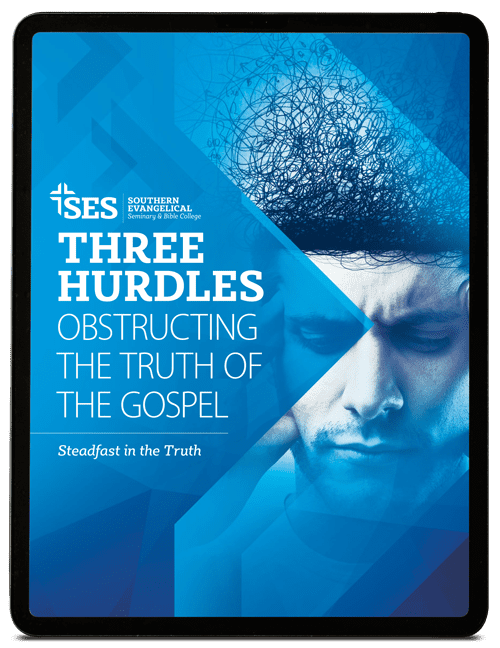Are you interested in becoming a biblical scholar, a pastor, an evangelist, or do you desire a deeper and better understanding of God and His word? It is most likely that you have been overwhelmed by the many seminaries in the country offering degrees that are variations on the term “Biblical Studies.” These programs come in all sizes, shapes, and prices. Is one better than the other? How do I choose the right program amid the plethora of seminaries? What do I look for?
If you are asking these questions, you are not alone. I asked these questions in late 2009 when I was preparing to attend Seminary to acquire a better understanding of God and the Bible. I graduated in 2016 from Southern Evangelical Seminary with a Master’s Degree in Biblical Studies, and I suggest 5 things that any serious student should consider when investigating any Biblical Studies Program.
Check out all of the Degrees at Southern Evangelical Seminary!
It’s Greek to me! Or is it Hebrew? | (Original Languages)
In His wisdom, God chose to reveal His Holy Scriptures in the Hebrew and Greek language. Yes, that is right! God did not reveal His Scriptures in the English language. However, we have excellent translations in English today. Any biblical studies program without, an introductory level course in the biblical languages (Hebrew and Greek) is anemic. Having a working knowledge of the biblical languages will help you better understand and grasp theological truths more vividly than without such a knowledge. In my opinion, this is the first and most important factor to consider when choosing a biblical studies program.
My Interpretation or Yours? | (Hermeneutics)
Jehovah Witnesses, Pentecostals, Prosperity Gospel Proponents, Baptists, Presbyterians— and the list goes on. All of them use the same Bible. But, how did they come to irreconcilably distinct doctrinal conclusions? This is a hermeneutical issue (as well as a translation issue). Wait! You may be wondering, “Hermen . . . who?” Don’t worry! When I joined Seminary, I had the same question, “What is hermeneutics”? Hermeneutics is the art of interpretation, and it is essential in your ability to combat competing interpretations of Scripture. Hermeneutics asks pertinent questions: “Can we get the meaning of the text?” “Where is the meaning of the text? —the mind of the author, or the text itself?” “If there is a meaning in the text, can we overcome our cultural biases to access it, or are we left to wander our Bibles in subjectivity?” Once I completed the courses at Southern Evangelical Seminary, I left with an understanding of interpretation and its necessity for Bible teachers to fulfill their duties as laid out in Scripture. As an SES alumnus, I have a greater appreciation for sound hermeneutics based on sound philosophy of language. A biblical program without a mandatory course on hermeneutics is like building a house without a foundation, and a house with no foundation is no house at all. Further, a good biblical studies program will offer introductory and intermediate courses. For example, SES offers various levels of courses on hermeneutics: Hermeneutics, Advanced Hermeneutics, as well as Philosophy of Language, are all courses SES offers to equip students with sound principles of interpretation. For those who want to steer clear of common mistakes in interpretation, courses like these are essential to any biblical studies program that will teach you to handle the Scriptures rightly.
Learn more about Southern Evangelical Seminary’s Philosophy and how it relates to interpretation!
I Know Only What I Was Told! |(Learning to Defend Sound Doctrine)
It is one thing to merely regurgitate pious doctrines learned in seminary. It is entirely another thing to be able to defend what was learned using reason. Seminaries that teach students to defend the reliability of the Bible and biblical doctrines (i.e., inerrancy) are becoming a rarity. An introductory course on apologetics (art of defending your belief) is invaluable to a good biblical studies program. In this day and age, it is important not only to know and believe the inerrancy of Scriptures and biblical doctrines, but also to know the reason and evidences that support that belief.
Why Did I Just Learn That? | (Application)
It is very clear from Scriptures that every believer has a part to play in the Church (Ephesians 2:10, 19-22, 4:15-16). Seminaries are tasked with a unique role, on behalf of the Church, to train believers for the work of the Lord. The goal of a seminary is to create trained ministers to serve at a local church. A good biblical studies program will require each student to be actively serving at a local church. A good biblical studies program will also provide opportunities for students to practice what was learned in class beyond mere classroom practice sessions or preaching practicum. Through their student ministry (T.E.A.M.), Southern Evangelical Seminary regularly provides the students with opportunities to teach, preach, do evangelism and apologetics, write academic and non-academic articles, engage in missions’ work, and much more.
Professors Know What? | (Qualified Professors)
Teaching is a skill built over years of research, study, and teaching. We would all agree that one should not go to a car mechanic to learn heart surgery. The reason is obvious— forgive me for the extreme example. Learning from experienced professors who continue in their research, studies, and publish papers/articles is invaluable. As you browse through the various programs offered by seminaries, take some time and look through the institution’s faculty, their educational qualifications, and their recent publications. If they have a blog or website, skim a few of their articles to find out their current research interests. Interact with them on email, phone, or even meet them at the seminary. I consider it a blessing to have interacted and learned from excellent professors at Southern Evangelical Seminary who are not only highly qualified, but also gifted teachers.
These factors will help you to separate the good biblical studies program from the mediocre ones. I wish all the very best as you prayerfully seek God’s guidance to choose the right program for you and your calling.
Sibu serves at Calvary by directing the outreach to the unchurched. An Indian by nationality, Sibu was raised in a Hindu home in Abu Dhabi, U.A.E. He accepted Jesus Christ as his Lord and Savior in 2002. Sibu is married to Nisha, who is also from India. They have two girls, Anugraha and Emanya.
Sibu holds a Bachelor’s degree in Computer Science and worked as a Networking Engineer in India before moving to Charlotte in 2009. Sibu earned a Master of Arts degree in Biblical Studies from Southern Evangelical Seminary, Charlotte.



 Sibu serves at Calvary by directing the outreach to the unchurched. An Indian by nationality, Sibu was raised in a Hindu home in Abu Dhabi, U.A.E. He accepted Jesus Christ as his Lord and Savior in 2002. Sibu is married to Nisha, who is also from India. They have two girls, Anugraha and Emanya.
Sibu serves at Calvary by directing the outreach to the unchurched. An Indian by nationality, Sibu was raised in a Hindu home in Abu Dhabi, U.A.E. He accepted Jesus Christ as his Lord and Savior in 2002. Sibu is married to Nisha, who is also from India. They have two girls, Anugraha and Emanya.







